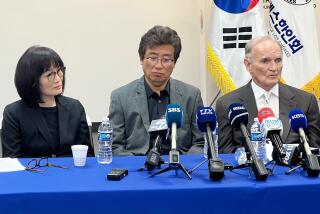China Snarls North Korean Reform
- Share via
BEIJING — For years, East Asia’s two Communist countries, China and North Korea, have characterized their relationship as being as close as “lips and teeth.”
But Friday, observers were left wondering whether the two have actually been talking to each other.
A Chinese government-backed news agency confirmed that Yang Bin, 39, a flamboyant entrepreneur whose orchid business has made him one of the richest men in China, had been taken in for questioning in the northeastern city of Shenyang on suspicion of unspecified “illegal business activities.”
Yang’s detention would have been just one more case in the catalog of alleged economic crimes in China were it not for the fact that he is reclusive North Korea’s choice to bring capitalism to a specially designated area.
The North Korean government tapped Yang on Sept. 23 to head its new special economic zone in Sinuiju, a city of several hundred thousand people on the Chinese-North Korean border. North Korea promised to give Yang, who holds Chinese and Dutch citizenship, wide latitude in governing Sinuiju’s affairs, and Yang, in turn, promised to usher in a political and economic revolution there.
But his detention fueled already rife speculation that authorities in Pyongyang, the North Korean capital, had appointed Yang without consulting Beijing and that Beijing was none too pleased by the choice.
The decision to call Yang in for questioning before dawn Friday forced him to put off a trip he had planned to Sinuiju later in the day to hash out details concerning the proposed capitalist enclave.
Yang, named China’s second-richest man last year by Forbes magazine, has been under investigation for unpaid taxes by his companies, including a Hong Kong-listed firm called Euro-Asia Agricultural Holdings Co. At an impromptu news conference held Thursday in Shenyang, where Euro-Asia is based, Yang dismissed the investigation, saying he planned to turn over about $1.2 million in tax payments next week.
“That’s no problem,” he told reporters. “I’ve already worked out an agreement about that.”
But the displeasure of Chinese authorities was evident. Police broke up the news conference, confiscating some of the journalists’ equipment and saying the gathering was illegal.
It was another misstep by a businessman with a reputation for being something of a maverick.
Last week, Yang announced that any passport-holding foreigner would be allowed to enter and leave Sinuiju through the Chinese city of Dandong on the opposite side of the Yalu River. But interviews with Chinese sources, including the border police, made it clear that Yang had not received clearances or worked out the details to enact such a policy. Foreign reporters who had hoped to cross were denied permission.
“That’s my personal mistake,” Yang acknowledged at Thursday’s abbreviated news conference. He asked for patience while he resolves the matter. It might not be settled until North Korea can erect a wall around Sinuiju to prevent foreigners from penetrating deeper into the country.
Yang also said foreign experts would be invited to help run the special economic zone’s legislative and judicial affairs. That will be a landmark step, if it happens, for one of the most insular and secretive nations on Earth.
Still, it is unclear how many of his plans Yang worked out with Pyongyang. He has bragged of close ties with North Korean leader Kim Jong Il, but it remains somewhat of a mystery how he was picked for the Sinuiju job.
The Chinese government has kept uncharacteristically mum about the whole affair since Yang was sworn in at a Sept. 24 ceremony in Pyongyang. It has said only that it supports reform in North Korea. State-controlled media have said next to nothing about the appointment, which analysts see as evidence that Beijing was taken aback.
In appointing Yang, Pyongyang said it would turn Sinuiju, a city of about 50 square miles, into a Hong Kong-like area of unbridled capitalism with little to no interference from the central government. But Pyongyang might forcibly move hundreds of thousands of residents to outlying areas before the experiment begins.
More to Read
Sign up for Essential California
The most important California stories and recommendations in your inbox every morning.
You may occasionally receive promotional content from the Los Angeles Times.











